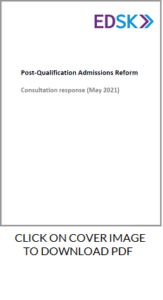 After many years of debate and discussion, it is encouraging to see the Department for Education (DfE) openly engage with potential reforms to the university admissions system in England. The ultimate test of any reforms will be whether they put in place an admissions system based on students choosing universities, not universities choosing students.
After many years of debate and discussion, it is encouraging to see the Department for Education (DfE) openly engage with potential reforms to the university admissions system in England. The ultimate test of any reforms will be whether they put in place an admissions system based on students choosing universities, not universities choosing students.
In June 2020, the EDSK think tank published a major report called ‘Admitting mistakes’, which explored the current university admissions system and concluded that fundamental changes are needed. The report started from the widely accepted premise that HE admissions must be:
• Fair – every student, irrespective of their income or wealth, should have access to the same universities and degree courses;
• Transparent – every student should have access to the information that they need to make informed choices about the different options available to them; and
• Equitable – every student, regardless of background, should be able to compete for a place at a university on a ‘level playing field’ with other students.
First and foremost, our response to the DfE’s consultation regarding post-qualification admissions reform (launched in January 2021) supports the DfE’s decision to reform the current system. In line with our report last year, we believe the goal should be to create an admissions model that delivers all three principles listed above. This summary of our consultation response explains how the DfE can design a system that achieves these principles with the least possible disruption.
Our analysis of the consultation finds that the Government needs to be bolder with its proposed reforms to make sure that the interests of students are prioritised over the interests of universities in future. EDSK recommends that the Government introduces a Post-Qualification Offers (PQO) admissions model with the following features:
- Universities should be banned from accepting students who fail to meet their advertised entry grade requirements for a degree course to ensure that there is complete transparency for students before and after results day, which would bring an end to ‘unconditional offers’
- Universities should be required to publish the number of places available on each degree course at the start of each application cycle, which cannot subsequently be altered by the university after results day
- The Government should not provide student loan funding for any student who is recruited by a university after missing their entry grades or who is recruited in excess of a university’s stated cap on student places for each degree
- Rather than universities choosing which applicants to accept or reject based on predicted grades, students should create a list of their 10 preferred degree courses in rank order as part of their UCAS application form. On results day, university places will be automatically allocated by lottery among all the applicants who meet the required entry grades for each degree based on their ranked list of preferences.
Through these measures and the other proposals outlined in our consultation response, ministers will be able to scrap predicted grades, end the scourge of ‘unconditional offers’ and promote fairness and transparency for all applicants, particularly those from the most disadvantaged backgrounds.
MAY 2021
The major report on university admissions published by EDSK in June 2020 contains the full range of evidence and analysis that sit behind the proposals in this consultation response. You can read a summary of the original report by clicking here.





